EPISODE 120: STORY TELLING
POP CULTURE SPIRIT WOW
Did you happen to catch Saturday Night Live this week? I couldn’t bear to watch it live. I just had no laughs in me. I could barely handle communicating with people; I constantly felt like I was on the verge of shattering into a million pieces.
But looking at show clips the next day, I was surprised at just how thoughtful some of it was.
Like host Dave Chappelle’s monologue comment (Note: adult content; it’s Dave Chappelle, people) to all the now-horrified white people: “We’ve been here before. We’ve been here before.”
Or an Election Night sketch in which Chappelle and Chris Rock watch white people react to Trump’s election. “Oh my God,” Cecily Strong says at one point, as Trump’s victory begins to look likely. “I think America is racist.”
“Oh. My. God,” Chappelle responds. “You know I remember my great grandfather told me something like that. But he was like, a slave or something, I don’t know.”
Later, when Trump has officially won, Beck Bennett announces “This is the most shameful thing America has ever done.” Rock and Chappelle look at each other and start laughing hysterically.

St. Ignatius, the founder of the Jesuits, spent a lot of time thinking about the movements that influence our decisions – what he calls the “good spirits”, which lead us to hope and generosity, and the “bad spirits” that draw us into despair or confusion. Afflicted by serious scruples himself for a number of years, during which time he was constantly worrying about his own sinfulness, Ignatius was definitely familiar with what a “bad spirit” could look like.
But as a result he also came to believe that the only way to deal with a bad spirit is to attack it. “The enemy conducts himself as a woman,” he writes. (Men: Awful Since The Beginning.) “He is a weakling before a show of strength, and a tyrant if he has his will.”
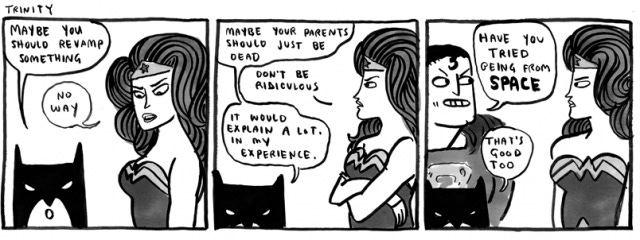
Personally, I’ve always found that trying to shut down one’s doubts or fears only gives them strength. They’re like comic book super villains; the more you hit them, the more powerful they become. Or they’re like little kids; you can ignore them for a little while and it’s okay. But they’re not going away. And until you listen they’re going to keep getting louder. And they’re going to keep repeating the same thing.
I find that the things that afflict us usually indicate something important within ourselves, some fundamental need, wound or fear that needs attention. Instead of rejecting it, like suddenly we’re in the Exorcist, the best bet is to try and listen. Give it a chance to be heard, and you might be surprised how its energy dissipates.
It’s like during my first semester teaching high school, one of my students disliked me so intensely that she insisted on a meeting between me, herself, the principal and her mother, where she could air her grievances without me being able to undermine them. Going in I was incredibly anxious; I feared that however she might represent me would be simply accepted by the other adults in the room and maybe then by other parents, too.
By some dumb luck I managed to keep my mouth shut as the student lacerated my abilities, enumerating a long list of my failings as a teacher. It was like “Man of Steel”, a never-ending nihilistic display of brutality.
But when she was finally done, and I hadn’t fought back, suddenly her fury just vanished. She looked at me in a daze, like she was waking up out of a dream and wasn’t sure what she was supposed to do next.
And I never had problems with her again.

Yesterday a friend of mine asked me, how long have Democrats spent trying to silence the voices of racism, of misogyny, of conservative rage in our society? And where has that gotten us?
Obama looked to be the gateway into a whole new maturity in our country and its way of thinking; yet in fact he spent eight years mostly facing more and more conservative groups working to discredit not only his policies but his person.
Say what you will about Trump’s election, it draws out into the light forces and fears that many of us, myself included, have tried to suppress. It’s awful to see ideas like the forced registration of Muslims presented as though it’s American. A nightmare.
But those sort of sentiments are a part of our country. And facing them is a path to insight, if not transformation.
Put another way, for those of us who were surprised by the outcome of this election, if a desire to understand isn’t part of our response, we’re going to be surprised again.
++
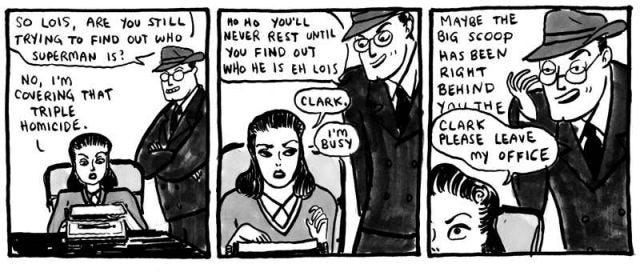
In one of my many attempts to escape the pain this week (hello bourbon my old friend) I saw “The Arrival”, that new Amy Adams/Jeremy Renner movie about an American linguist who has to figure out how to communicate with mysterious octopus smoke aliens before everything goes bad because have you seen us.
The film ends up being less about the sci fi of it all than about how the language that we use shapes our relationships. Without giving away any spoilers, one country uses a game as a basis for developing an understanding with the E.T. squid. A clever approach; you can pick up so much about another culture fast from their games. But games are also almost always about winners and losers. Which ends up meaning that country’s translations quickly take on an oppositional, hawkish bent.
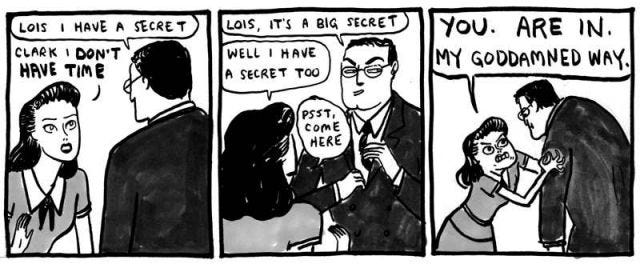
It’s a fascinating idea, how language not only enables us but limits us. These days I’ve been wondering something similar about story, namely whether the stories that we embrace might not affect our ability to see beyond ourselves or might help create the sort of culture gap we’re experiencing.
It’s hard to imagine, on one level. I’m so used to tracking how issues presented on television end up liberating or opening up our culture – how autism has become so much less taboo as a topic since “Parenthood” ; the effect of “The Ellen Show”, “Six Feet Under”, “Will and Grace” and most recently “Glee” on American culture’s understanding of homosexuality; or the rapid change in our society’s awareness and acceptance of transgender people in just the few years since “Transparent” (and also Bruce Jenner).
Also, I tend to think of our great stories as things that unite us, that help us see beyond our differences. Hillary Clinton and Donald Trump supporters disagree on many important things; yet I would guess that a high percentage of both groups love “Star Wars”, Marvel super heroes, “Frozen”. Doesn’t that represent some kind of an opportunity beyond all the conflict to connect?
(Random aside: do you notice what a high percentage of our shared pop culture gems are now owned and curated by the Disney Corporation? How weird is that? Also, does that mean I can blame Mickey Mouse for everything? Because what’s his deal anyway? #Scapemouse)
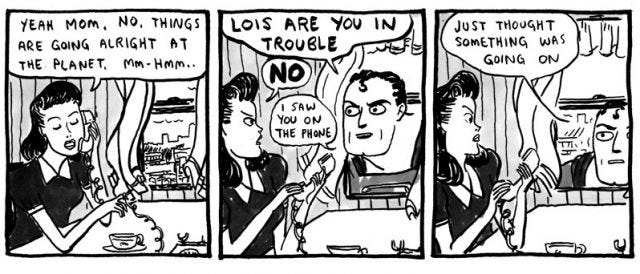
But then this week I had to write a piece about the history of another shared treasure, “A Charlie Brown Christmas”. It had been a bunch of years since I watched it, and I was particularly interested to see what would affect me. I thought it would probably be Linus retelling the Nativity story. Certainly that’s a memorable scene.
But you know, as sweet as that moment is, it kind of comes out of nowhere, and then just sort of disappears. It’s definitely important, but I can’t say it moved me.
No, for me, the really powerful moment is that scene at the very end when all the kids who have been ignoring and mocking Charlie Brown see his broken little Christmas tree, feel bad and fix it up. I watched that scene repeatedly, and it choked me up every time.
And as I was writing my article I kept thinking, how do you love a scene like that and then feel okay about letting our country strip away the rights of groups of Americans that have been mistreated, discriminated against, our country’s broken little trees, in many cases for generations? Or how do you feel comfortable about the possibility of tens of thousands of children potentially having their undocumented parents suddenly rounded up and deported after decades here?
How do you love the Rebellion in “Star Wars” and then vote for what looks and sounds an awful lot like the Empire? Or cheer for Dorothy and the gang in the “Wizard of Oz” but then embrace a worldview more like the Wicked Witch.
But millions did. And with great enthusiasm.

So I don’t know. Maybe in addition to connecting us our pop culture icons also hide or obscure important differences.
Or maybe popular shows like “The Walking Dead”, which paint the world in such bleak, oppositional terms, or our locust-like horde of superhero stories – I’m a comic book fanatic, and even I am getting a little deflated from all the Marvel movies -- are reducing our imaginations of what’s possible to us vs. them terms.
(I think it’s going to be very interesting to see how a show like “The Walking Dead” does in our new political situation. Negan is in many ways the left’s worst fears for Trump, just way more charming. Already I see reviews complaining that’s it’s now too dark for our times.)

++ LINKS ++
All the cartoons this week came from Kate Beaton, who is amazing and you should buy her books they make great Christmas gifts.
If you’re on social media you’ve probably already seen this, but Kate McKinnon singing “Hallelujah” at the start of Saturday’s SNL was pretty beautiful.
There is a whole article on the internets analyzing the attack strategies of each of the ghosts in the arcade game Pac-Man. How is that a real thing? And knowing that it is, how can I keep from dubstepping?
Also, in the midst of our new national apocalypse, has anyone considered that the real nightmare might be our more-annoying-than-flash-mobs new obsession with mannequins?
(Seriously, it’s way less clever than you think it is, people. You’re just standing there while a camera moves around you. All your videos are basically the same. Just stop. Go help someone.)
(Also, could there be a clearer way of indicating we feel like we have no power than to celebrate imagining ourselves as mannequins? I don’t think so.)
Lastly, if you haven’t seen that Dave Chappelle monologue, at the very end he tells an amazing story about a recent party he went to at the White House. No matter who you voted for or what you support, it’s a powerful statement.
++
I hate it when people tell me what to feel or not to feel. Shut up and stay in your own lane, buddy, you know?
But it's funny, when Jesus says “Don’t be afraid” in the Gospels, somehow it always reassures me. I think for me when he says it he's also saying, “I so get it. I’m totally freaking out right now myself. But that's totally normal. It’s going to be okay.”
(My Jesus uses a lot of unnecessary and emphatic adjectives.)
Who knows what tomorrow will bring. Maybe insanity. Maybe donuts.
Either way, it’s not the end. And all we can do is take it as comes.
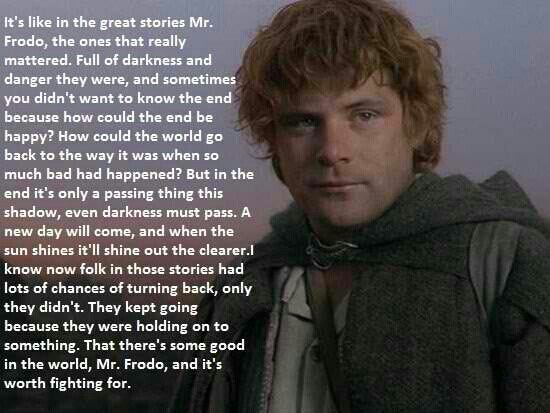
And Now, One Final Point
that Absolutely Must Be Made:


